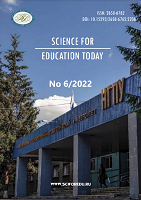Обзор исследований способов преодоления учебной неуспешности учащихся
Ways of overcoming academic failures: A review article
Author(s): Angelica A. Muratova, Ludmila Y. Shavshaeva, Elena MatvievskayaSubject(s): School education, Higher Education , Educational Psychology, State/Government and Education, Sociology of Education, Pedagogy
Published by: Новосибирский государственный педагогический университет
Keywords: Academic failure; Ways of overcoming academic failure; Parent involvement; Supplementary education; Mentoring; Mentoring forms; Developmental education programs, Students’ motivation for learning;
Summary/Abstract: Introduction. The article examines the problem of low learning outcomes of schoolchildren in the modern education system. The purpose of the article is to identify and summarize the ways of overcoming students’ academic failure from the standpoint of foreign and Russian studies for their use at schools. Materials and Methods. To achieve the aim of the review, 63 full-text sources were analyzed. The study used general research methods of theoretical knowledge, thematic content analysis, synthesis of theoretical foundations, and comparative method for identifying and summarizing research on ways of overcoming students’ academic failure in foreign and Russian theory and practice and their use at schools. The generalization of the research results was based of the systematic approach. Results. Analysis of the studies has shown that in order to overcome student failure at school, it is necessary to introduce practical methods in schools that will bring about a reduction in the level of unsuccessful students. Schools' work to involve parents in their children's education and school activities (engagement at home, engagement at school, academic socialization) has a positive impact on reducing student failure at school. A special role of the parent community is to develop students’ motivation to learn. The work of schools to integrate formal and non-formal education expands the educational space and contributes to overcoming school failure, developing the emotional, intellectual, communicative sphere, educational motivation and social advancement of students. The use of various forms of mentoring in schools mainly leads to the design of programs for students' personal growth, building their own professional path of self-development and developing motivation for learning. Using international experience in applying developmental programs in Russian schools will ensure equalization of starting opportunities for students with low socio-economic status. Conclusions. The review concludes that the introduction of ways to overcome the academic failure (parental involvement, supplementary education, using various forms of mentoring and international practices of developmental education programs) in the school practice will contribute to reducing the rate of student failure in school.
Journal: Science for Education Today
- Issue Year: 12/2022
- Issue No: 6
- Page Range: 32-54
- Page Count: 23
- Language: Russian

